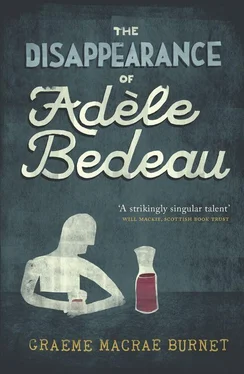It was inconceivable that Monsieur Gorski would retire. In the end he simply could not continue. He died of pneumoconiosis, caused, the doctor told him, by years of working in the dusty, ill-ventilated shop. He spent two dismal years sitting in his chair by the window above the premises. It was at this time that Gorski investigated the murder of Juliette Hurel. Not only was this the most sensational thing to have occurred in Saint-Louis for as long as anyone could remember, it was the only case in which Monsieur Gorski ever betrayed an interest. During the years of his father’s confinement, Gorski visited more frequently, bringing round a little shopping and sometimes some flowers to spruce up the dreary room.
‘You got the bastard yet?’ Monsieur Gorski would wheeze as soon as his son was over the threshold.
‘Not yet, Dad,’ Gorski would reply. He continued to answer this way even after Malou was convicted.
Mme Gorski never asked her son about his work. She made no secret of how proud she was of him, but she would not consider it her place to inquire about the day-to-day business of his job. Naturally she would be aware that he was now investigating the disappearance of Adèle Bedeau. She watched television and read the papers like everyone else, but she did not allude to it. Instead she sustained a monologue about the various people who had looked in on her since his last visit. Gorski, for his part, had no wish to discuss his investigations with his mother. It was relaxing to listen to her stream of gossip about these people he didn’t know.
Gorski washed up the crockery and put on his jacket.
‘See you soon,’ he said.
‘Don’t you worry about me,’ she said.
Gorski let himself out through the shop and walked back to his car. The light was fading and the streets were quiet. Gorski pulled up outside the police station. As he was locking his car, he saw someone raise an arm to him from the opposite side of the street. It was a young man, in his late teens or early twenties. He threw a cigarette onto the pavement and trotted across the road.
‘Monsieur Gorski?’ he said. He looked nervous. He kept his eyes trained somewhere around Gorski’s midriff as if he expected at any moment to receive a blow to back of the head. Gorski knew immediately he was the boy on the scooter.
‘Yes.’
‘I wanted to talk to you,’ he said. ‘You’re investigating Adèle’s disappearance.’
‘That’s right,’ said Gorski. ‘You know something about it?’
The boy nodded. Gorski lead him up the steps into the station. Schmitt was at the counter behind the glass partition. He looked up disinterestedly and buzzed the door open. The boy followed Gorski into the corridor. Gorski took him to an interview room and went off to fetch some coffee.
IN THE DAYS THAT FOLLOWED Juliette’s death, Manfred was numb. Sorrow, guilt and fear vied for his attention. Fortunately his grandparents were accustomed to him spending long hours alone in his room. That first evening he did not join his grandparents for dinner. How could he sit there when his sweetheart lay crumpled and dead in the woods and he, with whom she had only moments before exchanged the most passionate exhortations, had killed her? And yet, even then, there was an instinct of self-preservation that kept him in his room. It would surely be obvious to anyone who set eyes upon him that he was the guilty party.
During the storm that broke that evening, Manfred spent the night rigid on his bed, imagining Juliette’s body on its sodden deathbed. He saw the wind whipping up the cotton of her dress, the rain plastering her hair to her forehead. It was all he could do to prevent himself from rushing back out to the woods to cradle her drenched body. But he did not do so. And, at some point, he must have fallen asleep, because when he awoke the next morning, he experienced a brief moment of nothingness before the events of the previous day flooded back into his mind.
The storm had left a heavy smell of wet earth in the air. Manfred went downstairs at ten o’clock. His grandmother was in the garden. In the kitchen, the housekeeper ignored him as he spread a piece of bread with butter. He took one bite, which he was unable to swallow, and put it in the bin. Then he returned to his room. Later, there was a flurry of voices downstairs as news of the murder filtered through the household. Normally, the servants talked only in hushed tones, as if they were in a library. Manfred lay on his bed awaiting the police, but no one came. He realised it had been a mistake not to appear for dinner the previous evening. From now on he must act as if nothing had happened. He must at all times act naturally.
His grandfather looked askance at him when he appeared at the dining table. Manfred did what he always did when someone looked questioningly at him. He cast his eyes down and said nothing. He could hear the servants in the kitchen discussing the murder, but the matter was not mentioned at the dinner table. Instead, the meal was passed with a few banal remarks about the storm and Monsieur Paliard’s day at work. It seemed to Manfred a sick joke that his grandparents could behave as if nothing of note had occurred, as if his entire world had not come to an end. It seemed, furthermore, beyond belief that nobody could see that he was the killer. Manfred forced down a few mouthfuls of food before excusing himself at the earliest opportunity. He went upstairs and threw up.
Within two or three days, Manfred accustomed himself to behaving normally. He presented himself at mealtimes, skulked in his room and even forced himself to leave the house during the day, although he did not, of course, go near the woods. He betrayed no particular curiosity about the murder, nor did he pretend that it was of no interest to him. He began to think of himself as an actor preparing for the role of his former self. He drew no satisfaction as each day passed without his arrest. He was indifferent to his fate. But he came to understand why no one could see that he was guilty. All the talk in the papers and among the servants was of a monster, some beast abroad in the woods or further afield who could and, undoubtedly would, strike again. The maids were nervous of leaving the house and women were advised not to walk the streets unaccompanied. Amid this talk, Manfred was just a boy. Nobody was looking for a boy.
In the early evening of the fourth or fifth day Manfred heard a detective being ushered into the parlour at the front of the house. It was some minutes before Monsieur Paliard made his way to where the policeman was waiting. Manfred’s grandfather had a low opinion of the police and he would have made a point of keeping the detective waiting. The murmur of voices reached Manfred in his bedroom. He pictured the detective, in his fifties, wearing a crumpled raincoat over a crumpled suit, neatly parted grey hair, narrow darting eyes. The voices subsided then he heard footsteps and his grandmother calling his name from the bottom of the stairs.
Manfred sat on the edge of his bed. He imagined being led handcuffed down the drive to a waiting police car, a crowd of onlookers greeting his appearance with catcalls. As he drew nearer, their cries would subside and he would hear them stage-whisper, But he’s no more than a boy. Not even a man.
Manfred stood up and walked slowly down the stairs. He felt relieved that his burden was about to be lifted. He wondered if the detective would accuse him straight off or slyly question him, slowly drawing the truth from him. There was no need for such a strategy. Manfred had no intention of denying anything.
The detective was not as he had imagined. He was young, thirty perhaps, with a modest, unthreatening air. He stood, looking somewhat ill at ease, with his back to the large stone fireplace. There was a tray of coffee things untouched on the table. The parlour was rarely used. It was a large formal room, which even at the height of summer retained a chill.
Читать дальше












